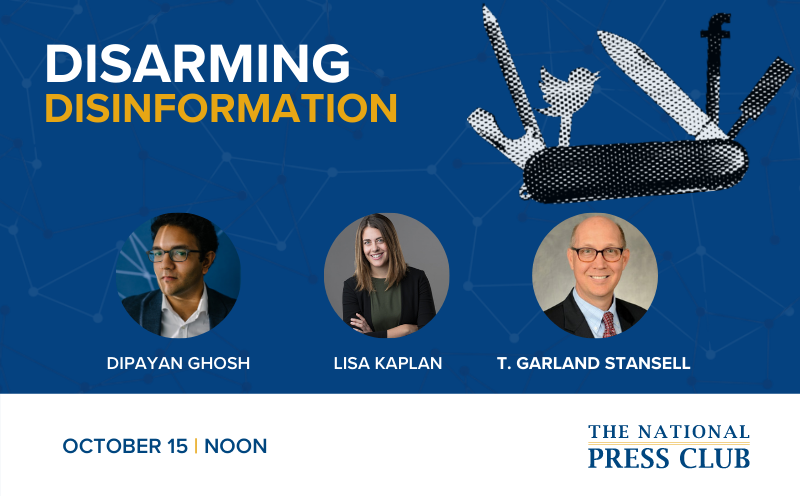Social media taking disinformation's impact to new levels, Communicators panel says

Disinformation, or the intentional spread of false information, is not new. However, the use of social media platforms and big data have taken the issue to new and much more concerning levels, as the Cambridge Analytica scandal brought to light following the 2016 election.
The National Press Club Communicators Committee recently hosted the first in a series of critical conversations on disinformation and how we can address it as journalists and communicators.
Panelists for “Dark PR: Disinformation for Hire” included Dr. Emma Briant, author and visiting research associate in Human Rights at Bard College; Brittany Kaiser, co-founder of Own Your Own Data Foundation; Wendell Potter, former health insurance communications executive and whistleblower; and Craig Silverman, media editor of BuzzFeed and expert on disinformation and fake news. The event was moderated by former journalist Debra Silimeo, a member of the Communicators Committee and president of The Silimeo Group.
Silimeo opened with a few sobering facts:
- Lies travel about six times faster than the truth.
- In 2016, fake election news stories generated more total engagement on Facebook than top election stories from 19 major news outlets combined. (Buzzfeed)
- Foreign and domestic actors are engaging in “narrative laundering,” supercharging misleading stories with real documents.
- A new breed of PR firms proudly uses tools to change reality according to their clients’ wishes.
Panelists talked about the “weaponization” of false and misleading information and how people are being increasingly manipulated by these “sophisticated actors,” noting that there is an entire industry behind creating fake news sites that is powerful and largely unaccountable.
The biggest platform, Facebook, is one of the major culprits in helping to spread fake news and disinformation, said Kaiser, who is a big proponent of digital and media literacy training for everyone.
Potter talked about “front groups” that are pouring “massive amounts of money” to influence elections and change the narrative about important conversations, such as healthcare. He said the problem goes well beyond social media’s influence, saying that traditional media is also being used to disseminate propaganda.
One the positive side, Silverman said there has been “an awakening” about the seriousness of the spread of disinformation which, he said, has gotten even worse since the 2016 election. For their part, newsrooms have ramped up their fact checking.
Panelists touched on a range of solutions. They include the need to expose “bad actors”; hold platforms that spread disinformation accountable; establish real enforcement in industry guidelines, such as the Public Relations Society of America’s Code of Ethics; and train and educate the public about how to navigate digital media and emphasize the importance of “lateral reading” to verify the accuracy of what they are reading.
To listen to the 75-minute panel discussion, click here.
On Oct. 15, the Communicators Committee will host a second panel discussion to continue the conversation and dive deeper into what can be done to curb the spread of disinformation. Registration for Club members is free. There is a $15 fee for non-NPC members to register. Register here.

